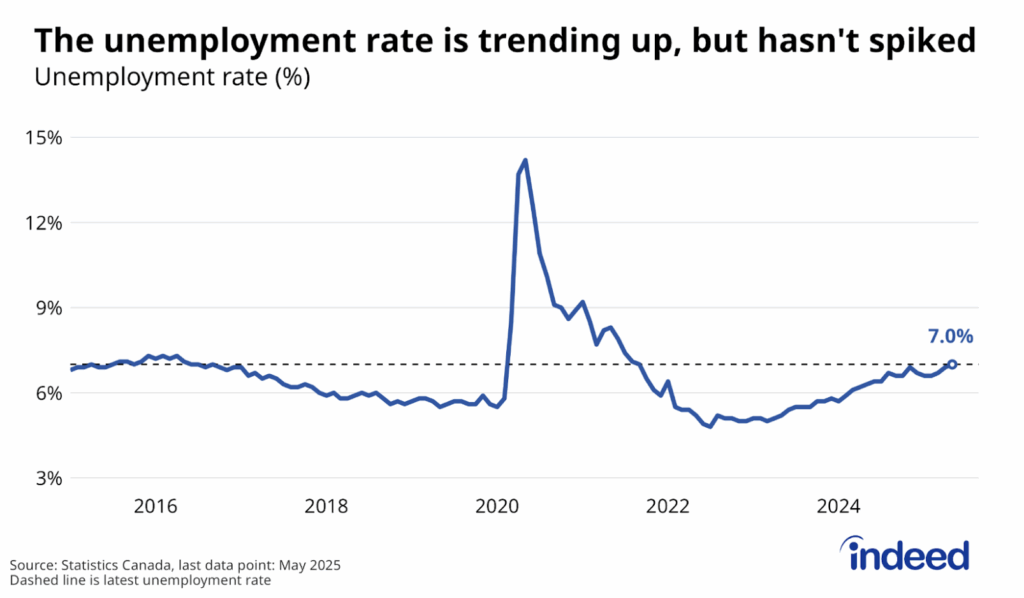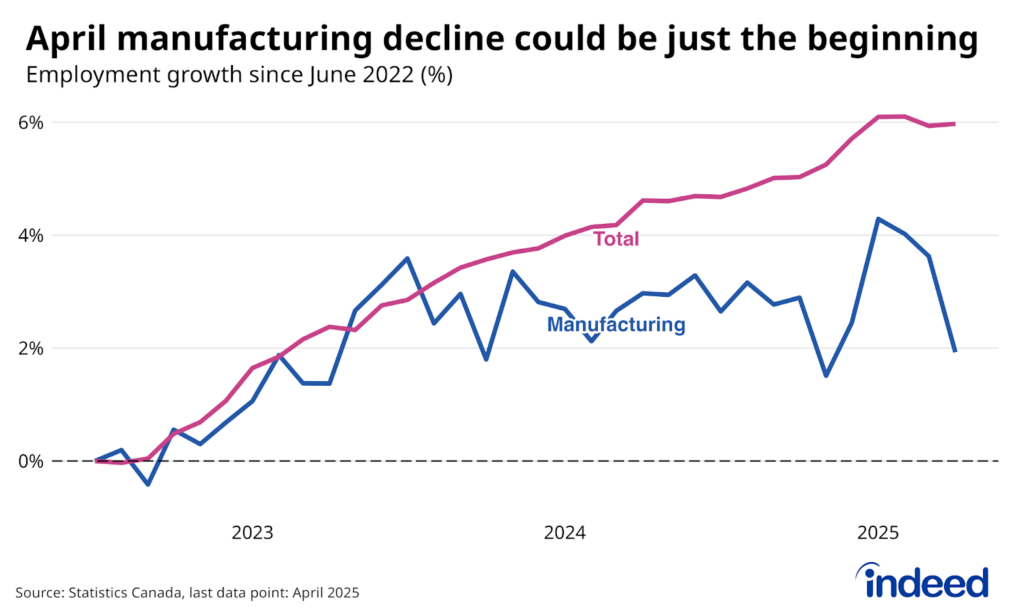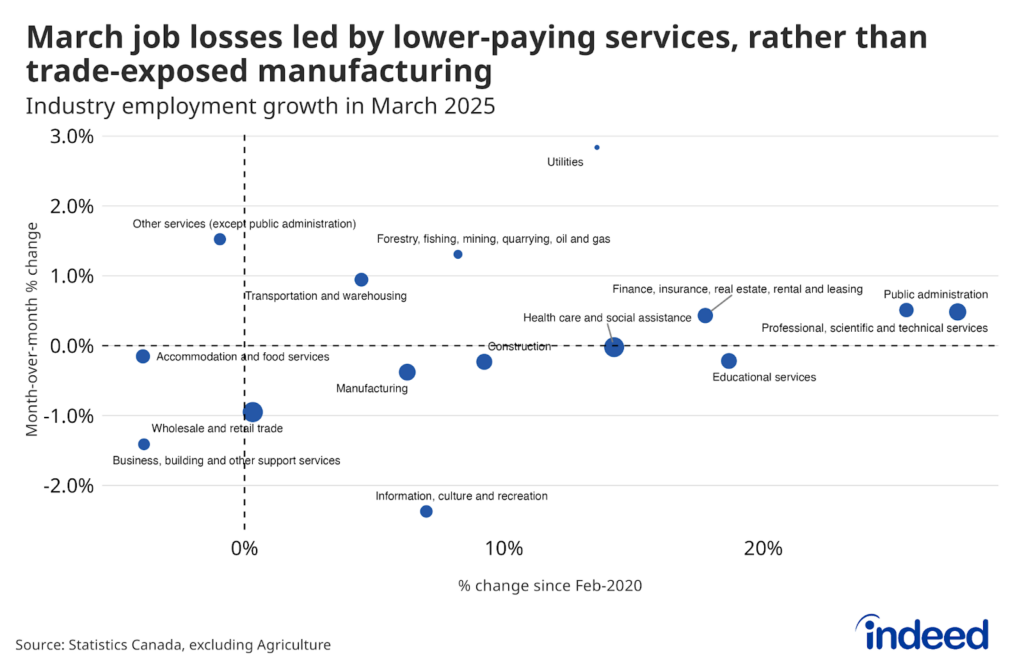Key Points
- According to the latest Indeed Job Search Survey, in April, 54% of active Canadian job seekers expressed confidence they could find a new job within the next month, up from 43% last July.
- Since the start of the year, job seeker confidence has been particularly strong among certain groups with relatively low unemployment rates, such as job seekers in Quebec and men with post-secondary education.
- Some demographics with elevated unemployment rates, such as youth and recent immigrants, were also relatively confident about finding work quickly, possibly because they may be more flexible in their job search.
- Women rated their near-term job-finding prospects lower than men did, with the gender gap especially wide among university graduates.
Falling unemployment and plentiful job opportunities have made the Canadian labour market increasingly favourable for job seekers. And people on the job hunt have noticed. Active job seekers in Canada across a range of demographics expressed increasing confidence they could find new work quickly since last summer, according to the latest Indeed Job Search Survey. The survey has polled 4,000 Canadians per month since July 2021 about their job search patterns.
In April, 54% of survey respondents who reported actively looking for work indicated they were either “somewhat” or “very” confident they could find a new job within a month. That was up from 43% who expressed confidence last July, a statistically significant increase.

Confidence rose among unemployed job seekers and even more among employed job seekers, causing the gap between the two groups to grow somewhat since the middle of last year. Meanwhile, perceptions of the labour market have improved across a range of demographics groups, too. Nonetheless, significant differences remain, highlighting the wide range of circumstances job seekers face in today’s economic landscape.
Quebecers, men, and youth are more confident
Over the first four months of 2022, just over half of Canadian job seekers were at least somewhat confident they could find work quickly. However, confidence varied across a range of dimensions, including region, gender, and age.
Job seekers in Quebec were particularly upbeat about their job-finding prospects. Between January and April, 62% of Quebecers looking for work were at least somewhat optimistic they could find a new position within a month, higher than other regions by a statistically significant margin. This probably reflects Quebec’s long-term labour market improvement. In March, the province’s unemployment rate was the lowest in Canada, a major shift from a decade earlier. By contrast, slightly less than half of job seekers in Ontario and Alberta were at least somewhat confident they could find work quickly.
Within Quebec, job seeker confidence was noticeably higher among men than women. However, this gap wasn’t particularly unique. Across Canada, 57% of men looking for work were at least somewhat confident they could find a new job quickly compared with 45% of women. The gender difference was statistically significant in all regions except British Columbia. This overall 12 percentage point gap reflects lower proportions of women in both the “somewhat” and “very” confident job seeker categories.
While confidence was higher among men with young kids than without, confidence was similar among women whether or not they had young children, suggesting childcare difficulties weren’t the main source of the gender difference. However, the contrast is consistent with other challenges women confront in the Canadian labour market, including pay discrepancies and unequal opportunities for advancement.
For their part, younger job seekers were more confident they could find work quickly than older ones. People ages 18 to 24 on the job hunt had the most optimistic expectations of their near-term prospects, with 55% saying during the first four months of the year they could find work quickly. Those ages 25 to 34 and 35 to 45 weren’t far off. Conversely, less than half of job seekers over 45 were confident they could find new work in the next month, a statistically significant gap.

Fewer years of work experience might limit the access of younger job seekers to some jobs, but it also could mean they have greater flexibility in searching for opportunities compared with more experienced workers who are already slotted into a particular niche in the job market. In addition, some young people in school are focused on their studies and might only look for work if they were fairly confident they could find it, potentially increasing reported confidence among active job seekers.
Men, but not women, with higher education express greater confidence
Canadian unemployment rates are typically lower among those who have completed post-secondary education compared with those who haven’t. This contrast is also evident in job seeker confidence — but only among men.
Among job seekers over 24, that is, those who’ve likely completed their studies, 65% of male university graduates were either somewhat or very confident they could find work quickly. Meanwhile, the share among men with college diplomas or trades certificates stood at a solid 56%. But less than half of male job seekers who hadn’t completed post-secondary education indicated they were confident. The differences across education levels were apparent among both employed and unemployed job seekers.

Women expressed less confidence than men across all education levels, but the gap was especially wide among university grads. Just 42% of women with bachelor’s degrees or higher searching for work indicated they were optimistic they could find work quickly — even less than the 44% of female high school and college graduates. This gap remained after controlling for a range of other demographic factors and recent industry work experience.
Recent newcomers more confident than average, unlike longer-tenured immigrants
Recent immigrants have higher unemployment rates than people in other demographic groups, but they are also relatively more confident they can find work quickly, a pattern similar to the contrast between young and older job seekers. Both men and women who arrived in Canada within the past 10 years reported greater confidence in their near-term job prospects than respondents born in Canada, even after controlling for a range of other factors, like age and education. Conversely, immigrants who’ve been in Canada longer weren’t as confident as other groups.
As with youth, higher near-term confidence among newcomers could reflect potentially greater flexibility in job search, despite less experience in the Canadian labour market. However, it could also reflect the rapidly improving employment situation of recent arrivals to Canada. While other groups in the 25-to-54 age bracket have recouped their early pandemic job losses, employment rates of recent immigrants now substantially exceed their pre-pandemic levels. A significant employment rate gap remains compared with those born in Canada, but it has narrowed significantly over the past two years.
What does stronger confidence mean for the labour market?
Canadian job seeker confidence has increased as the employment situation has trended further in their favour. But what happens next? Rising confidence is consistent with ongoing declines in both unemployment and under-employment. However, other features of a tight labour market — such as greater job hopping and stronger wage growth — haven’t fully taken hold. Will stronger job seeker confidence spark a shift?
The fact that groups such as youth and recent immigrants are expressing elevated confidence could mean upside potential for the overall labour market. This will depend on whether these perceptions translate into real improvements in the relative labour market status of these groups in the months ahead, allowing them to catch up with workers in other demographic categories.
Meanwhile, the picture remains challenging for women. The substantial confidence gap between men and women suggests it will take more than a hot job market to even the labour market playing field in Canada.
Methodology
This blog post is based on separate online surveys of 4,000 Canadian adults ages 18-64 conducted July 15-20, August 9-23, September 13-29, October 11-20, November 8-25, December 6-29, January 10-26, February 7-22, March 7-23, and April 11-26. The survey was conducted among various general population survey panel audiences. Awareness, use, or other relationship with Indeed was not a requirement for participation. There was no mention of Indeed or any other job sites in the survey and respondents were not aware that the survey was sponsored by Indeed.
Weights were applied to match respondent distributions across age, educational attainment, and time spent in Canada with the Labour Force Survey public use microfile data from January 2021 through June 2021.






